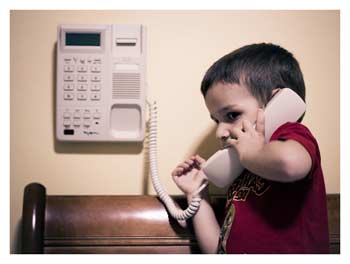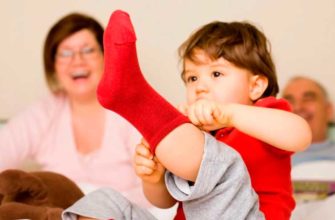Perhaps, all parents are familiar with the situation when they need to leave home for a couple of hours, leaving the child alone. Some mothers leave quietly, being confident in the independence of the child, while others do not find their place, every minute calling the 10-year-old child. When and how much can you leave your children at home alone? How to ensure the safety of the child and prepare them for this event?

Leaving a child unattended - when?
Experts say that the optimal age for this kind of independence is seven years. The future student already has an idea of what is possible and what cannot be done, uses the phone and follows parental instructions. But seven years is just a rough guide. It is necessary to take into account children's personality: temperament, behavior, impulsiveness and the level of development of everyday skills.
No need to afford 5-6 year old children, no matter how independent they may seem. The first impression is often incorrect, and the seemingly so rational kid is able to get confused in a force majeure situation. Experts advise relying in this decision not on children's age, but solely on maternal intuition and female intuition.
What do the laws of the Russian Federation say about this?
In many European countries, leaving alone young children who are not yet 12 years old can lead to the withdrawal of their social services. In some US states, teens under 14 years old must bring a nanny with them or bring them home for the duration of your absence.
Russian law does not provide for special restrictions and clear age limits, upon reaching which adults can leave a child unattended. In any case, only you have the full responsibility and it is up to you to decide when to teach your kids independence.
Independence Check
- The child goes about his own business for one and a half to two hours and does not pull his relatives every five minutes.
- She is not afraid of the darkness and the enclosed space: she plays in the nursery behind a closed door and is able to fall asleep without light.
- He knows the limits and the rules of safe behavior, he does not need to repeat why you can not go to the window or talk with strangers.
- Confidently uses communication means: home and mobile phone, ICQ, Skype.
- You entrust him with certain duties (to clean the room, make a bed, look after for a pet), with which he successfully copes.
- You do not control his every step, constantly reminding you that you need to collect toys and go to bed.
- He knows the emergency numbers and is aware of the responsibility for the fake call.
- Can seek help from neighbors and other close people in the event of any problem.
- It doesn’t take offense that mother leaves him alone, and understands the reason for your employment.
- He dreams of becoming an adult and an independent person.
If you scored eight pluses out of 10, it means that your children are ready for a short loneliness and do not need every second control.
Beware leave of your offspring alone, if you answered “no” to most points, and also if he:
- sick - high fever, vomiting, bouts of chronic diseases (asthma, epilepsy) pose a serious threat to life;
- a baby with “special needs” (autism, mental retardation, cerebral palsy);
- excessively curious, shkodliv, naughty, hyperactive;
- trusting in relation to strangers;
- fearful and impressive, panic due to loud noise, unexpected visitors and calls.
Home Safety Technique
[sc: rsa]
It is difficult to predict the actions of a child left alone, because fear, curiosity and love for experiments can lead him. Therefore, it is necessary to establish the rules of safe behavior and rehearse with literally every step they take, while not overloading them with unnecessary instructions. Then you can leave the apartment with a calm soul.
 Explain the most important principle - in any emergency (smoke has appeared, the electricity has been cut off, the crane has been cut off, neighbors are flooded from above), you should contact adults. Even if the child is guilty of an incident, they will not scold him, but, on the contrary, will help.
Explain the most important principle - in any emergency (smoke has appeared, the electricity has been cut off, the crane has been cut off, neighbors are flooded from above), you should contact adults. Even if the child is guilty of an incident, they will not scold him, but, on the contrary, will help.- Make sure that the child has learned by surname the last names, first names and patronymics of parents and grandparents, their place of work, their address of residence.
- Type in the memory of the children's mobile phone numbers of relatives, as well as emergency response services. Tell us how to answer operator questions.
- Install on your laptop special programs (browser or parental control) that protect against malicious viruses and inappropriate content.
- Close the windows before leaving. Ideally, they should be equipped with special valves or special locks that only you can open.
- Save children from temptations - hide medicines, matches, lighters, cigarettes, bottles with household chemicals and alcohol. Remove fragile and piercing-cutting objects, turn off the gas.
- Show how to turn on and off the computer, TV, microwave, after making sure that the wiring is working. If the child does not already know how to use the microwave, leave foods that do not need to be prepared (granola with milk, yoghurts, sandwiches with sausage and cheese).
- Never open doors to strangers! They may be introduced by police, doctors, gas workers, and close acquaintances of their parents. The child must immediately inform you of each such case.
- Teach you to talk with strangers on the phone: you can’t tell that he is alone now, to state his address and personal information. The standard answer looks like this: “Mom is busy. Please call back at 16.00 ".
- Call periodically to make sure that your child is “safe and sound.” Tell the neighbor that he was left alone and leave her a spare set of keys.
READ ALSO: how to secure a home for a child
How to prepare children?
- Cook in advance. From the age of four, leave the child alone in the nursery for half an hour, occasionally spying on him. In joint activities, provide more freedom by letting you choose what you like.
- Start small. For the first time, leave the baby for 15-20 minutes, going to the store or for a walk with the dog. Gradually increase the time of absence: first half an hour, then an hour. At eight years, a student can stay a maximum of one and a half hours.
- Come on time. Be punctual - they promised to return at 18.00, which means that you need to come home at exactly six in the evening.Younger students already have concerns for the lives of loved ones. And your punctuality is a great example for children.
- Do not punish the mess. Having got the entire apartment at its full disposal, the child can arrange an adventure for himself or imitate mom or dad. Do not be surprised to find your lipstick on your daughter’s lips.
- Do not go away from a sleeping baby. Do not “run away” during daytime sleep, even if before the child was willingly sitting alone at home. Despite the fact that you warned about your absence in advance, he would forget about it and would be scared if he did not find any of his relatives in the apartment.
- Come up with an activity. Do not leave children alone without having previously offered them interesting entertainment. Get coloring with felt-tip pens, puzzles, a set for modeling, download cartoons or educational programs for a laptop. If a child is bored, there is a chance that he is abusive or harming himself.
- Take an interest in what he did. Returning home, pay attention first to the child, hug, kiss, and only then do the cleaning or dinner. Ask what he was doing, if anyone had come. Praise your courage and be sure to compensate for your absence by reading a book, playing together or taking a walk.
Children, being left alone in the apartment, acquire invaluable experience: they learn to occupy themselves, to allocate time correctly and struggle with their own fears. These important qualities are sure to come in handy when they grow up. Teach your child to follow all safety precautions, and then you will leave him with a calm heart.
READ ALSO: The child does not let his mother away: what to do?
The child psychologist Julia Ulyanova will tell you how to teach a child independence, but not endanger it:
“TUT discussions” child psychologist Anastasia Shepel:









First of all, it is necessary to exclude all possible objects that he might fall into his hands and lock this room. The toys vryatli him for a long time will be busy, so I constantly give him access to the Internet, in which he can spend a day simply.
An informative article, I learned something new, how interesting my father is. Such a situation is coming soon, the son is growing by leaps and bounds. Interesting tests for independence are described. I tried with my sons, until fifty to fifty. But he is still too early at five.
My wife and I leave our son, who is five years old, but only when he sleeps and not for long, run to the store no more. Further, when such a need arises, we will come up with activities for him not to be bored.